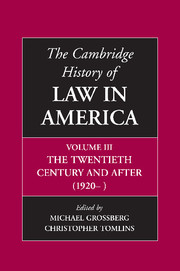Book contents
- Frontmatter
- 1 Law and the State, 1920–2000: Institutional Growth and Structural Change
- 2 Legal Theory And Legal Education, 1920–2000
- 3 The American Legal Profession, 1870–2000
- 4 The Courts, Federalism, and The Federal Constitution, 1920–2000
- 5 The Litigation Revolution
- 6 Criminal Justice in the United States
- 7 Law and Medicine
- 8 The Great Depression and the New Deal
- 9 Labor’s Welfare State: Defining Workers, Constructing Citizens
- 10 Poverty law and income Support: From the Progressive Era to the War on Welfare
- 11 The Rights Revolution in the Twentieth Century
- 12 Race and Rights
- 13 Heterosexuality as a Legal Regime
- 14 Law and the Environment
- 15 Agriculture and the State, 1789–2000
- 16 Law and Economic Change During the Short Twentieth Century
- 17 The Corporate Economy: Ideologies of Regulation and Antitrust, 1920–2000
- 18 Law and Commercial Popular Culture in the Twentieth-Century United States
- 19 Making Law, Making War, Making America
- 20 Law, Lawyers, and Empire
- Bibliographic Essays
- Notes on Contributors
- Index
- References
6 - Criminal Justice in the United States
Published online by Cambridge University Press: 28 November 2008
- Frontmatter
- 1 Law and the State, 1920–2000: Institutional Growth and Structural Change
- 2 Legal Theory And Legal Education, 1920–2000
- 3 The American Legal Profession, 1870–2000
- 4 The Courts, Federalism, and The Federal Constitution, 1920–2000
- 5 The Litigation Revolution
- 6 Criminal Justice in the United States
- 7 Law and Medicine
- 8 The Great Depression and the New Deal
- 9 Labor’s Welfare State: Defining Workers, Constructing Citizens
- 10 Poverty law and income Support: From the Progressive Era to the War on Welfare
- 11 The Rights Revolution in the Twentieth Century
- 12 Race and Rights
- 13 Heterosexuality as a Legal Regime
- 14 Law and the Environment
- 15 Agriculture and the State, 1789–2000
- 16 Law and Economic Change During the Short Twentieth Century
- 17 The Corporate Economy: Ideologies of Regulation and Antitrust, 1920–2000
- 18 Law and Commercial Popular Culture in the Twentieth-Century United States
- 19 Making Law, Making War, Making America
- 20 Law, Lawyers, and Empire
- Bibliographic Essays
- Notes on Contributors
- Index
- References
Summary
Anyone vaguely familiar with the career of American criminal justice in the twentieth century knows this story does not have a happy ending. A liberal democracy that incarcerates more of its people per capita than any other nation on the planet cannot take pride in its crime policies; nor have those policies, like a revolver in the nightstand, made Americans feel particularly secure. Criminal justice – like crime itself – is often assumed to be an intractable social problem, timeless and impervious to reform. Who among us can imagine modern society without the prison? But criminal justice is inescapably the product of history. The historical trajectory of American criminal justice no longer seems as certain or progressive as it once did. When American criminology was still in its infancy as a scientific discipline, around the turn of the twentieth century, practitioners told the story of punishment in uniformly whiggish terms: a steady march toward ever more humane, modern methods. The past century in criminal justice now looks far otherwise: a record of abrupt shifts, stark continuities, and stunning reversals.
The twentieth century opened with a dramatic transformation in the ideas and institutions of American criminal justice. The United States was in the throes of industrial expansion, an era of rapid urbanization and mass immigration that had already turned a predominantly agrarian country into the world’s most productive industrial economy. To regulate the harshest human consequences of industrial capitalism, social reformers, lawmakers, and innovative government officials began to put together the pieces of an administrative-welfare state.
- Type
- Chapter
- Information
- The Cambridge History of Law in America , pp. 195 - 231Publisher: Cambridge University PressPrint publication year: 2008



